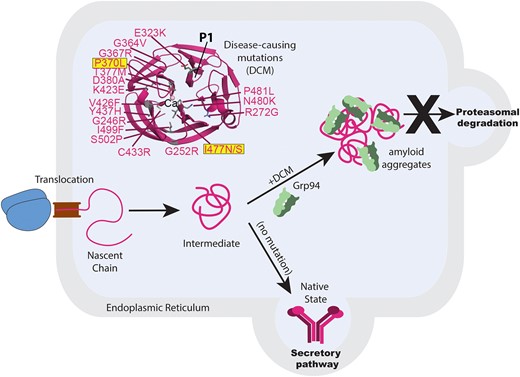2025-02-24 ジョージア工科大学
<関連情報>
- https://research.gatech.edu/under-pressure-georgia-tech-researchers-discover-new-way-treat-glaucoma
- https://academic.oup.com/pnasnexus/article/4/1/pgae556/7920644
緑内障を引き起こすER常在凝集体の抗体介在による除去 Antibody-mediated clearance of an ER-resident aggregate that causes glaucoma
Minh Thu Ma, Ahlam N Qerqez, Kamisha R Hill, Laura R Azouz, Hannah A Youngblood, Shannon E Hill, Yemo Ku, Donna M Peters, Jennifer A Maynard, Raquel L Lieberman
PNAS Nexus Published:10 December 2024
DOI:https://doi.org/10.1093/pnasnexus/pgae556

Abstract
Recombinant antibodies are a promising class of therapeutics to treat protein misfolding associated with neurodegenerative diseases, and several antibodies that inhibit aggregation are approved or in clinical trials to treat Alzheimer’s disease. Here, we developed antibodies targeting the aggregation-prone β-propeller olfactomedin (OLF) domain of myocilin, variants of which comprise the strongest genetic link to glaucoma and cause early onset vision loss for several million individuals worldwide. Mutant myocilin aggregates intracellularly in the endoplasmic reticulum (ER). Subsequent ER stress causes cytotoxicity that hastens dysregulation of intraocular pressure, the primary risk factor for most forms of glaucoma. Our antibody discovery campaign yielded two recombinant antibodies: anti-OLF1 recognizes a linear epitope, while anti-OLF2 is selective for natively folded OLF and inhibits aggregation in vitro. By binding OLF, these antibodies engage autophagy/lysosomal degradation to promote degradation of two pathogenic mutant myocilins. This work demonstrates the potential for therapeutic antibodies to disrupt ER-localized protein aggregates by altering the fate of folding intermediates. This approach could be translated as a precision medicine to treat myocilin-associated glaucoma with in situ antibody expression. More generally, the study supports the approach of enhancing lysosomal degradation to treat proteostasis decline in glaucoma and other diseases.

